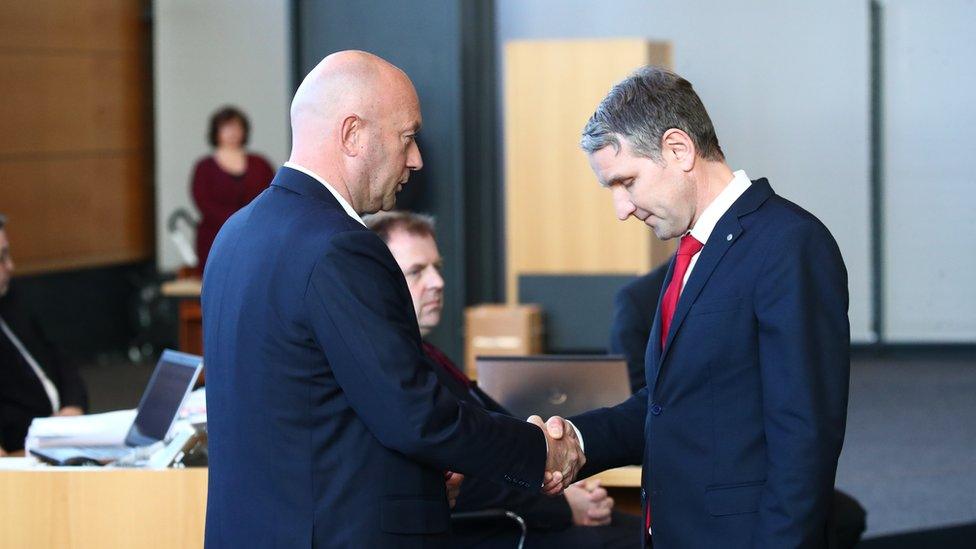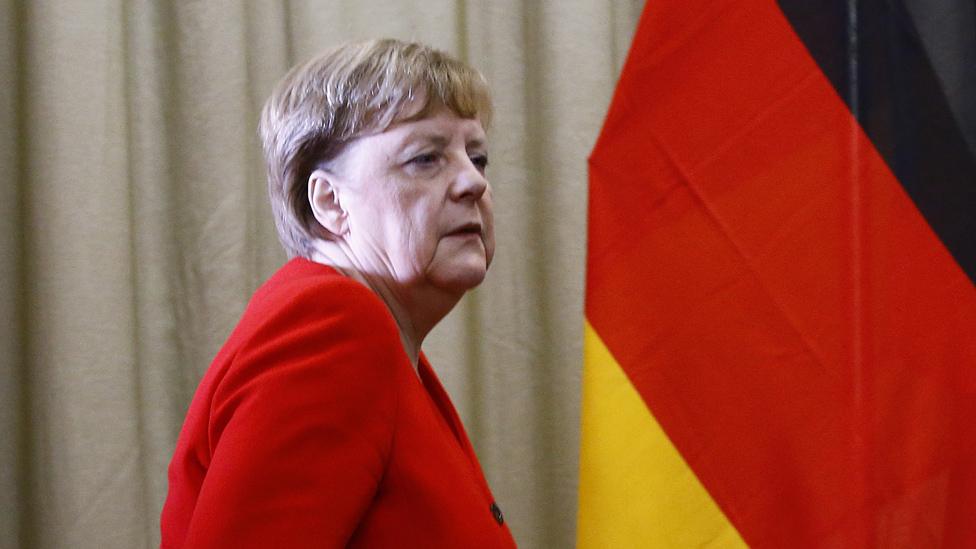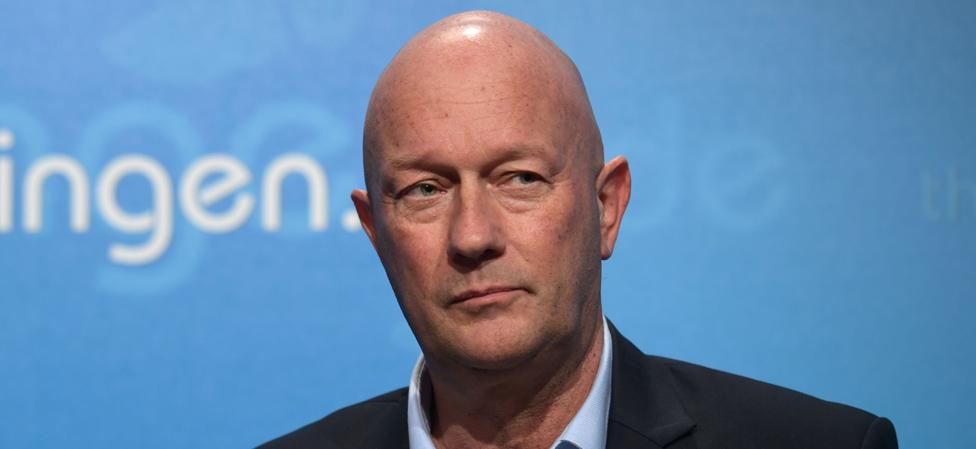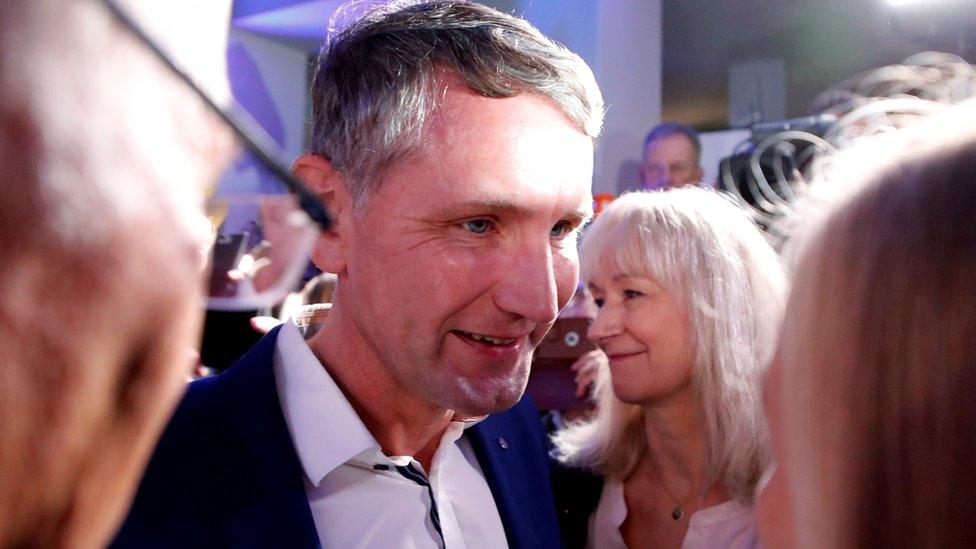Germany AfD: Thuringia PM quits amid fury over far right
- Published

There was shock as the new state premier, Thomas Kemmerich (left), shook hands with local AfD leader Björn Höcke
A German state premier elected with the help of the far-right AfD says he is resigning to pave the way for fresh elections.
The election of liberal leader Thomas Kemmerich in the eastern state of Thuringia prompted national outrage.
"Resignation is unavoidable," he said. For years Germany's main parties have shunned Alternative for Germany (AfD).
Chancellor Angela Merkel - whose own party also backed Mr Kemmerich - called Wednesday's election "unforgivable".
The AfD has grown in popularity in recent years but has been condemned for its extreme views on immigration, freedom of speech and the press.
Wednesday's vote was described as a political earthquake as it was the first time the AfD had helped form a government in Germany, breaking a consensus among the main parties never to work with extremist parties.
Mr Kemmerich has now announced he will seek new elections in the state, "to remove the stain of the AfD's support for the office of the premiership".
He will need a two-thirds majority to dissolve the chamber and bring about a fresh vote.
What happened in Thuringia?
Despite the AfD having broad support in Thuringia, the state election in October was won by the far-left Die Linke. And the liberal Free Democrats (FDP) had just 5% of the vote, barely scraping into the local parliament in the state capital, Erfurt.
But on Wednesday, in the secret vote to pick the leader of the government, Mr Kemmerich of the FDP beat Die Linke's leader Bodo Ramelow by 45 votes to 44 - thanks to votes from the AfD.
Is Germany's AfD racist?
Mr Kemmerich also got votes from local MPs in his FDP and Mrs Merkel's Christian Democrats (CDU), prompting outrage from critics, who said the two centre-right parties had apparently made a pact with the far right.
Mr Kemmerich insisted there had been no co-operation with the far right and accused the AfD of carrying out a "perfidious trick to harm democracy".
However, there are now suggestions the FDP and AfD had discussed a pact in Thuringia before.
A letter sent by AfD's Thuringia leader to Mr Kemmerich on 1 November has gone viral on Twitter, in which the regional AfD leader offered his party's support - either to form a technocratic government or a minority FDP-led government. It would break the long-standing red-red-green ruling coalition in Thuringia, he said.
The letter, first reported by regional broadcaster MDR at the time, external, shows that the AfD was seeking a deal long before Wednesday's political shock.

An earthquake in German politics
By Jenny Hill, BBC Berlin correspondent
Germany may have pledged "never again". But 90 years after the rise of the Nazi Party, the far right has once again played - albeit briefly - the role of kingmaker in a German state.
The former Belgian Prime Minister Guy Verhofstadt was among those who took to social media in protest, circulating a photograph of a newly-elected Mr Kemmerich shaking hands with Thuringia's AfD leader Björn Höcke, and juxtaposing it with one of Hitler greeting the then-German President Paul von Hindenburg.
Barely a week ago, this country reflected on the atrocities of World War Two, during commemorations to mark the anniversary of the liberation of the Nazi death camp at Auschwitz.
That the far right has been able to wield such influence, that a mainstream political party accepted its support and that, knowingly or otherwise, Angela Merkel's CDU appeared to align with them is, for many, the source of great shame.

What was the reaction?
There were immediate calls for Mr Kemmerich to resign. Speaking on a visit to South Africa, Chancellor Merkel said the Thuringia vote had to be reversed.
"It was a bad day for democracy, a day that broke with the long and proud tradition of the CDU's values. This is in no way in line with what the CDU thinks, how we have acted throughout our party's existence," she said.

Mrs Merkel insists her party cannot do deals with the far right
CDU leader Annegret Kramp-Karrenbauer also said Mr Kemmerich should stand down, and her party's Social Democrat coalition partners in Berlin called on the CDU to distance themselves from the AfD. Both parties plan to hold crisis talks on Saturday.
Amid the growing pressure, Mr Kemmerich told reporters on Thursday that his FDP had decided to request the dissolution of the state parliament.
FDP leader Christian Lindner had travelled to Erfurt on Thursday for talks with Mr Kemmerich ahead of the party's statement. After the resignation he called for a vote of confidence in the party's national leadership.
Some have compared the AfD's surprise move to the Nazis' rise to power and there were protests in several German cities after the election.
In 1930 a Nazi entered the Thuringia government, the party's first big breakthrough in the Weimar Republic, culminating in Adolf Hitler's appointment as chancellor in 1933.

Thomas Kemmerich denied there was any deal to co-operate with the AfD
The Thuringia AfD is led by Björn Höcke, one of the AfD's most controversial figures.
He sparked an outcry when he condemned the decision to place the Holocaust memorial in the heart of Berlin, describing it as a "memorial of shame".
What is the AfD?
The anti-immigration and anti-Islam AfD has MPs in all 16 of Germany's state parliaments.
Nationally the AfD has 89 seats in the lower house of parliament (Bundestag), out of 709 in total, making it the largest opposition party.


In a tweet (in German), the AfD hit back, external at people who compared them with the Nazi Party because of their extremist views.
"These Nazi comparisons, for example one by Peter Frey of @ZDF, really stink. We in the AfD stand FOR a law-based state, democracy, political pluralism and FOR Jewish life in our country. We are AGAINST all violence and censorship of opinion. Stop the incitement!" the tweet said.
Among the tweets comparing the AfD to the Nazis was one from Die Linke's Bodo Ramelow, who juxtaposed a photo of Hitler becoming chancellor with Wednesday's photo of Mr Höcke shaking hands with Mr Kemmerich.
The tweet included a quote from Hitler, who said in February 1930: "We achieved the greatest success in Thuringia. Today we really are the crucial party there... The parties in Thuringia, which up until now formed the government, cannot get a majority without our assistance."
Allow X content?
This article contains content provided by X. We ask for your permission before anything is loaded, as they may be using cookies and other technologies. You may want to read X’s cookie policy, external and privacy policy, external before accepting. To view this content choose ‘accept and continue’.
- Published28 October 2019
